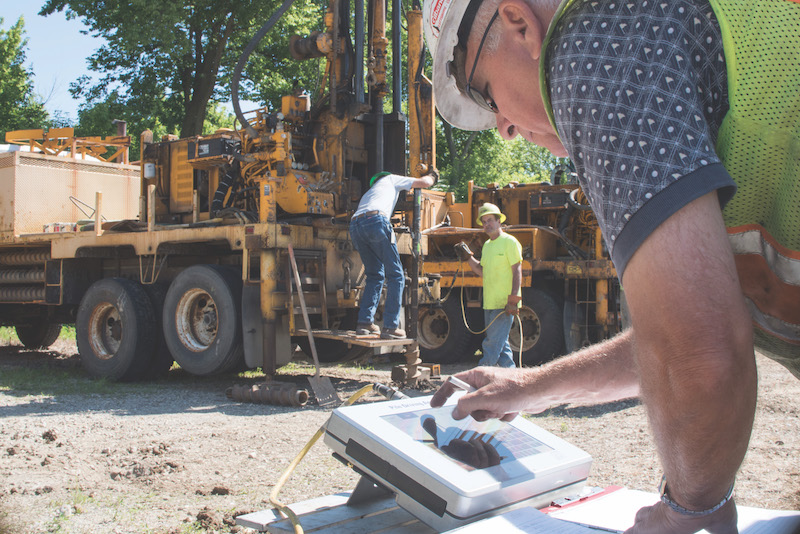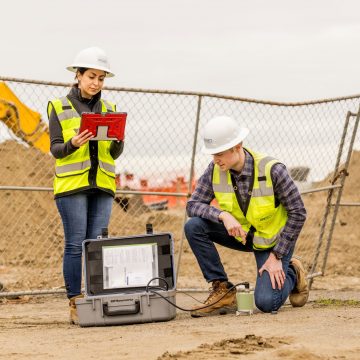Recognizing the Comprehensive Duty of Geotechnical Engineers in Ground Investigation and Soil Evaluation for Building Jobs
Geotechnical engineers are indispensable to the success of building and construction jobs, offering necessary insights through extensive ground investigations and dirt evaluation. Their expertise in assessing soil behavior and using sophisticated testing strategies informs crucial choices that maintain structural stability and safety. By determining prospective hazards and working together with multidisciplinary teams, these specialists considerably influence project results, consisting of efficiency and cost-effectiveness. However, the complexities of their role typically extend past these functions, prompting a deeper exploration into the approaches they use and the ramifications of their searchings for on total task practicality.
Function of Geotechnical Designers
The critical duty of geotechnical designers in construction projects can not be overemphasized, as they offer vital understandings into soil behavior and website conditions. These specialists are entrusted with analyzing the suitability of the ground for numerous sorts of frameworks, making sure safety and security and stability throughout the building process. Their knowledge encompasses a broad variety of activities, consisting of site characterization, soil sampling, and lab testing, which are crucial for figuring out the physical and mechanical buildings of the soil.
Geotechnical engineers utilize their searchings for to establish fundamental styles that fit load-bearing needs and minimize threats associated with soil settlement, liquefaction, and incline security. They play an essential function in determining potential threats, such as groundwater variations and contamination, which can significantly influence job viability. They work together with designers, civil engineers, and service providers to ensure that geotechnical factors to consider are integrated right into the total design and building and construction stages.
Ground Investigation Strategies
Ground investigation methods develop the foundation of geotechnical design, allowing engineers to obtain a comprehensive understanding of subsurface conditions. These strategies are important for analyzing soil properties, identifying groundwater degrees, and recognizing potential geological risks.
Typical techniques consist of borehole boring, which allows for the extraction of soil samples at numerous depths, providing important information for evaluation. Furthermore, in situ testing methods, such as Common Infiltration Examinations (SPT) and Cone Infiltration Examinations (CPT), are used to review dirt toughness and thickness straight in the ground.
Geophysical techniques additionally play a significant role in ground investigations. Techniques such as seismic surveys and electrical resistivity tomography help assess subsurface attributes without substantial excavation. geotechnical eng. These non-invasive approaches are especially beneficial in sensitive or large areas where interruption have to be reduced
In addition, exploratory trenches can be dug deep into to visually examine soil layers and determine any type of anomalies. Each of these methods contributes distinct insights, permitting geotechnical engineers to develop precise site analyses and inform design decisions. In recap, a mix of these ground examination strategies is important for successful construction tasks, ensuring safety and structural honesty.
Dirt Analysis Approaches
Dirt evaluation methods are critical for recognizing the chemical and physical homes of dirt, which directly influence the layout and building and construction of foundations and other frameworks. Various techniques are utilized to analyze dirt characteristics, ensuring that geotechnical engineers get exact information for informed decision-making.
One commonly used method is grain size analysis, which identifies the distribution of fragment dimensions within a dirt sample. This is important for categorizing soil kinds and forecasting their habits under tons. An additional important technique is Atterberg limitations screening, which reviews the plasticity and wetness web content of fine-grained soils, offering understandings right into their design residential properties.

Field tests, such as Common Infiltration Examinations (SPT) and Cone Infiltration Examinations (CPT), deal useful in-situ data concerning soil strength and stratification. Jointly, these dirt evaluation methods create the structure of geotechnical investigation, allowing engineers to make safe and efficient structures tailored to the particular conditions read review of the site.
Risk Mitigation Techniques
Implementing reliable risk mitigation methods is necessary for geotechnical engineers to attend to possible challenges in construction projects. These methods are important in recognizing, evaluating, and handling threats connected with soil problems, website security, and groundwater fluctuations, which can detrimentally influence project outcomes.
One primary strategy involves conducting extensive site examinations that utilize sophisticated geophysical strategies and extensive soil sampling. By obtaining accurate information on subsurface conditions, designers can make educated choices on layout and construction techniques. Additionally, utilizing anticipating modeling tools enables the simulation of numerous circumstances, making it possible for engineers to foresee possible issues and apply preventive measures.
Moreover, establishing clear interaction channels amongst project stakeholders promotes a collective approach to risk management. Normal updates and appointments guarantee that all parties are aware of the evolving website conditions and can adjust their methods as necessary.

Effect On Building Tasks
The performance of danger reduction methods straight influences the overall success of building projects. Geotechnical designers play a crucial role in this domain name, as their experience in ground investigation and soil evaluation informs essential decisions throughout the construction process. By properly analyzing dirt problems and determining potential threats, these experts allow task groups to devise reliable services that lower risks connected with ground instability, water infiltration, and various other geotechnical obstacles.
The influence of detailed geotechnical analysis appears in various aspects of building and construction projects, consisting of cost management, job timelines, and structural integrity. Early identification of issues enables prompt interventions, decreasing expensive delays and budget overruns. An extensive understanding of website problems enhances the layout and design process, ensuring that frameworks are developed to hold up against environmental stress and prospective natural disasters.
Ultimately, the payments published here of geotechnical designers are indispensable to the effective implementation of construction tasks. Their job not only cultivates security and conformity with policies however additionally enhances the lasting sustainability of frameworks, guaranteeing that they perform successfully throughout their desired life expectancy. The cooperation between other stakeholders and geotechnical teams is necessary for attaining optimum results in construction undertakings.
Verdict
Finally, geotechnical engineers carry out an essential function in building and construction jobs via comprehensive you can try these out ground investigations and dirt evaluations. Their knowledge in evaluating soil behavior, employing numerous investigation methods, and executing danger reduction approaches significantly contributes to the structural integrity and safety of built environments. By teaming up with multidisciplinary groups, these professionals improve project efficiency and make certain compliance with safety and security criteria, eventually bring about successful construction end results and minimized possible threats.
Geotechnical designers are essential to the success of building and construction projects, offering crucial insights through detailed ground investigations and dirt analysis.The critical function of geotechnical designers in building projects can not be overstated, as they offer important understandings into soil habits and site problems. Their experience incorporates a wide range of tasks, consisting of website characterization, dirt tasting, and laboratory screening, which are essential for figuring out the mechanical and physical properties of the dirt.
By precisely examining dirt conditions and identifying prospective dangers, these specialists enable task teams to create efficient services that lower dangers associated with ground instability, water infiltration, and other geotechnical obstacles.
In conclusion, geotechnical designers execute a crucial feature in construction tasks with comprehensive ground investigations and dirt analyses.